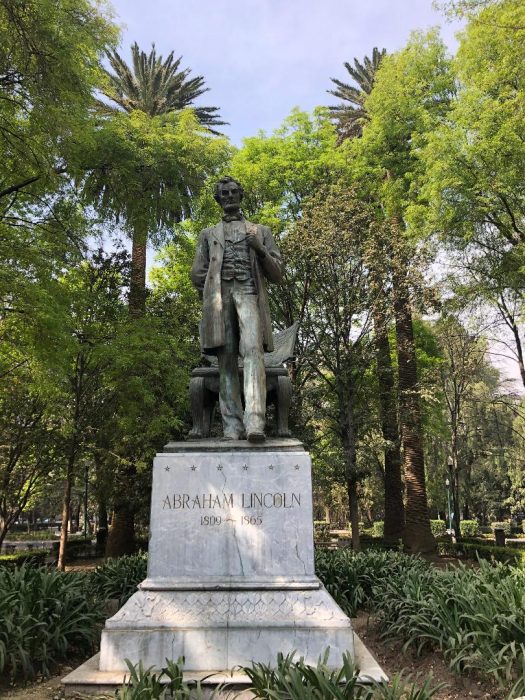As President Trump continues to fragment the U.S.-Mexico relationship by disparaging NAFTA and insisting that Mexico pay for a $20 billion dollar border wall, it’s hard to imagine a time when a Republican president stood up for the United States’ southernmost neighbor amid times of turmoil.
But history, with its tendency to surprise, sheds light on how a young congressman by the name of Abraham Lincoln —who would later become the revered 16th president of the United States— defended the Mexican people by opposing the U.S.-Mexico War. Years later, as the Civil War was coming to an end, President Lincoln’s generals supplied Mexico with arms and troops to fight off the French occupation of North America. While Lincoln is most notably known for the Emancipation Proclamation, many history books omit or gloss over Lincoln’s influence on Mexico.
“He actually did risk his career to stand up for Mexico when he objected in Congress to the invasion of Mexico, saying it was unjust, unconstitutional, and unnecessary,” said historian Michael Hogan, author of Abraham Lincoln and Mexico. “Then he was accused by President Polk of giving aid and comfort to the enemy. He was not re-elected to the House. He ran for the Senate and was defeated, and when he asked for a job as Postmaster, he was also turned down.”
But Lincoln wasn’t alone in accusing Polk of misleading Congress about reasons for initiating the war between the U.S. and Mexico. Henry David Thoreau and John Quincy Adams also dissented to starting a war, which culminated in the acquisition of 761,606 square miles of new U.S. territory and cut Mexico’s territory by more than half. Even U.S. General Ulysses S. Grant, who was a junior officer during the war, called it “the most unjust war ever waged against a weaker nation by a stronger” in his memoirs.


A statue honoring Abraham Lincoln at Parque Lincoln in Mexico City. (Photo by Rocío Guenther.)
Mexico’s current economy and the constant flow of northward migration is linked to the seizure of Mexico’s main ports to the west, the fertile lands of California, the silver mines of Nevada, and a big tract of rivers and lakes in the southwest. For many Hispanic families that have lived in these territories for generations, the border crossed them.
“Lincoln’s views on the war with Mexico are ones that should inform every briefing on border politics, every discussion on illegal immigration, every class engaged in a discussion of the conquest of Mexican land, and every polemic about border walls,” Hogan writes. “We should examine the prejudices that we still harbor against Mexicans as they gradually repopulate a territory which a short time ago was theirs.”
As part of his research, Hogan unearthed a letter penned by Lincoln which was addressed to Matías Romero, a 24-year-old Mexican envoy who was sent abroad by Benito Juárez in 1861 to congratulate Lincoln on his election. In the letter, Lincoln expressed support for the Mexican Republic and Juárez, who was forced to flee to exile in 1863 as the imperial army of Napoleon III attacked Mexico and imposed the puppet emperor Maximilian I. Romero managed to establish a relationship with Lincoln by befriending First Lady Mary Todd Lincoln and accompanying her on shopping trips.
The young envoy actually used proof of his correspondence with Lincoln to raise over $18 million from bankers in New York and San Francisco for Juárez’s cause to dethrone Maximilian. For generals Grant and Sheridan, and other Americans who aided Romero, France was violating the Monroe Doctrine, which meant a threat to the Western Hemisphere. Romero convinced Grant to “lose” 30,000 rifles on the border just as the Civil War had concluded and then Sheridan, along with others, encouraged volunteer troops to join Juarez’s liberal army in the Battle of Querétaro.
“We learn of the triumphal entry of Juárez into Mexico City not only by his liberal army but also by American volunteers, including colored troops, who won their freedom in the Civil War and now helped Mexico defeat a foreign invader,” Hogan said.
Lincoln’s sympathy for the Mexican people has not gone unnoticed south of the border. In fact, the country honors Lincoln with a slew of statues in Tijuana, Chihuahua, Ciudad Juárez and Mexico City, where a park even bears his name. Under Lincoln, Mexico and the U.S. gradually became tighter allies, which set the stepping stones for a bilateral relationship that only grew stronger through the years.
As we honor President Lincoln and other U.S. presidents today, we should all take note of his invaluable insight into U.S.-Mexico relations. If memory ceases to convince us that a strong U.S.-Mexico relationship is beneficial for both countries, then we need only look to history and Lincoln’s moral stand. He surely would have been against forcing Mexico to pay for a border wall that will only divide and fracture neighboring countries. Voices from the past shed light on how “good neighbor” policy makes both countries stronger and how we have always been stronger when we work together.
***
Rocío Guenther is a bilingual, bicultural journalist currently based in San Antonio, Texas. She enjoys writing about immigration, the U.S.-Mexico relationship, bilateral trade and travel. Her work has been featured in the Rivard Report, DemocracyNow! and PRI’s The World. Rocío also works as a volunteer Spanish translator for National Geographic’s Out of Eden Walk, spearheaded by Pulitzer-Prize winning journalist Paul Salopek. She tweets from @RocioGuenther.


